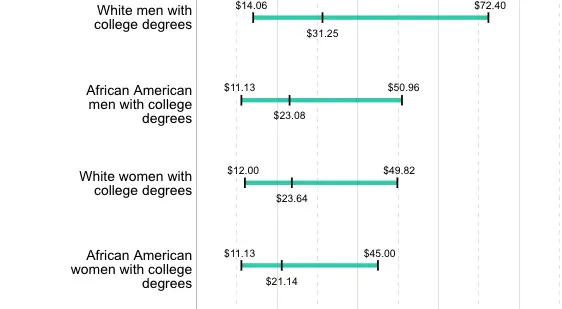Welcome to the CashforKat Personal Finance Book of the Month post for June and July! For the next two months, I am reading, Unbound: How Inequality Constricts Our Economy and What We Can Do About It.
Every month, I choose one personal finance book that I’ve read (or want to read!) that I think will provide value to those starting their personal finance journey. Last month’s Personal Finance Book of the Month (May) was Your Money or Your Life by Vicki Robins and Joe Domingues.
Note from Kat: I picked this book because of the current situation going on in America. Topics of Race and Gender overlap with Personal Finance and need to be discussed. This post is monetized with Amazon Affiliates. If you make a purchase using my link, then I will donate all of the proceeds to the NAACP.
Personal Finance Book of the Month: Unbound: How Inequality Constricts Our Economy and What We Can Do About It
Reviews of Unbound: How Inequality Constricts Our Economy and What We Can Do About It
Overall, the critics seem to enjoy this book and the author’s unique take on the impact of inequality on economic output. This book was named as one of the best economics books of 2019 by Martin Wolf of the Financial Times and MIT Technology Review.
The recurrent theme in reviews is that Boushey backs her opinions up with facts. She argues that inequality impacts not only growth but also the ability for innovation to take place in the US.
“Lays out a powerful argument on how inequality harms growth, competition, and innovation.”―ProMarket
“For a long time, the argument over inequality was about whether it was the price that had to be paid for a dynamic economy. In this outstanding book, Heather Boushey…turns this upside down. She shows that, beyond a point, inequality damages the economy by limiting the quantity and quality of human capital and skills, blocking access to opportunity, underfunding public services, facilitating predatory rent-seeking, weakening aggregate demand and increasing reliance on unsustainable credit.”―Financial Times
“Copies of this book should be mailed to every legislator in the country. It is a powerful summary of an enormous amount of the latest and best economics research on inequality, presented clearly and explained with accessible prose.”―Suresh Naidu, Columbia University
If you are interested in reading along with me, check out Unbound: How Inequality Constricts Our Economy and What We Can Do About It!
About the Personal Finance book of the month author:
Heather Boushey
Heather Boushey is an economist and the President/CEO of the Washington Center for Equitable Growth.
Boushey has a Ph.D. in Economics from the New School for Social Research and was selected as the Chief Economist for Hillary Clinton’s 2016 presidential transition team!
She is a highly respected economist and writes regularly for publications like The New York Times and The Atlantic. Boushey often makes appearances on CNBC, PBS, Bloomberg, etc. to provide an expert’s opinion on the state of the economy.
Here is one of Boushey’s recent Tweets on economic inequality:
Racial inequality is at the heart of American inequality, and the pandemic has laid bare the fragilities at our nation’s core.
— Heather Boushey (@HBoushey) June 5, 2020
For half a century, we’ve allowed economic inequality to rise, making us more susceptible to COVID & its devastating effects. https://t.co/zBuIplFhqb
Here is an excerpt from Boushey’s book listing on Amazon:
Boushey argues that inequality undermines growth in three ways. It obstructs the supply of talent, ideas, and capital as wealthy families monopolize the best educational, social, and economic opportunities.
It also subverts private competition and public investment. Powerful corporations muscle competitors out of business, in the process costing consumers, suppressing wages, and hobbling innovation, while governments underfund key public goods that make the American Dream possible, from schools to transportation infrastructure to information and communication technology networks.
Finally, it distorts consumer demand as stagnant wages and meager workplace benefits rob ordinary people of buying power and pushes the economy toward financial instability.
How to Get Unbound: How Inequality Constricts Our Economy and What We Can Do About It
This book is available in hardcover at a discounted rate on Amazon, or you can check it out for free with the Audible trial! If you have a Kindle or the Kindle App, you can also read it on your electronic device of choice.
If you decide to buy this book with one of the affiliate links in this post, 100% of the proceeds will go to the NAACP!
“The mission of the National Association for the Advancement of Colored People (NAACP) is to secure the political, educational, social, and economic equality of rights in order to eliminate race-based discrimination and ensure the health and well-being of all persons.” – NAACP Mission Statement
My thoughts on Inequality Constricting Our Economy
When I was at UC Berkeley, I took a sociology class that further opened my eyes to how access to resources during your childhood directly impacts the opportunities you have in life.
By limiting the growth of women and minorities in the workplace, we are limiting the potential of more than half of our population! It is not surprising to me that this significantly constricts our economy.
After researching Boushey and her book, it seems that there have been numerous studies on the productivity of our economy in relation to race/gender. These studies challenge our assumptions that our country runs on. It is scary to think about how much policy has been made based on how we believe the economy works instead of what the data tells us.
My thoughts on What We Can Do About It
After doing further research into these topics, it turns out that a lot of the underlying assumptions that we have about how the economy works are wrong.
One belief that I used to have was that obtaining a higher education degree would directly result in more equal earnings for women and minorities. Unfortunately, this is not the case.
According to the Washington Center for Equitable Growth, the median earnings for a woman of color with a bachelor’s degree is $10 an hour less than that of a white male with a bachelor’s degree.

The biggest thing that we can do to combat income inequality is to learn more about how it occurs and implement research-backed solutions. The numbers around wages do not lie and they give us actionable insight into the truth about how our economy is doing when it comes to decreasing discrimination in the workplace.
Final Thoughts
I am so excited to read this book! I will update this post at the beginning of July once I have finished it, so be sure to subscribe. In the meantime, let me know in the comment’s section:
Have you read this month’s personal finance book, Unbound: How Inequality Constricts Our Economy and What We Can Do About It by Heather Boushey? Are you planning to read it?

Kathryn Rucker is a sales consultant and content writer. With 7+ years of sales experience, she is passionate about helping businesses and individuals grow their sales pipelines by improving their online presence.
She has been traveling full-time since 2018 thanks to the location and financial independence she has gained from her business, Kat Rucker Consulting Group. You can connect with her on LinkedIn.
Kathryn Rucker is a sales consultant and content writer. With 7+ years of sales experience, she is passionate about helping businesses and individuals grow their sales pipelines by improving their online presence.
She has been traveling full-time since 2018 thanks to the location and financial independence she has gained from her business, Kat Rucker Consulting Group. You can connect with her on LinkedIn.


Great read. I will definitely be looking into getting these books!
Thanks for stopping by Sonya! I’m glad you enjoyed 🙂
It’s crazy how much gender and race inequality there still is. I recently heard a ChooseFI podcast where the interviewee said that black women are 3x more likely to die in childbirth in a US hospital than white women. How is that even possible in a first world country? Change is definitely overdue and this book sounds like it’s an interesting read that challenges our assumptions.
Thank you for listing all of these resources and graphs! This was a really informative post about the inequality that exists today.
Thank you so much for stopping by! I’m glad you enjoyed the resources and graphs, I try to include only trustworthy articles in my post so that we can all learn from accurate sources.
I had never heard of this book before but am now going to add it to my list. Thank you for the recommendation. Not sure I will be reading at the same time as you but will come back to this post when I’m done to compare our thoughts.
Thanks, Maria! I’m glad to hear it made it onto your reading list too 🙂 Check back towards the end of July for the updated post. I’m looking forward to hearing your thoughts too!
Very cool! I love the books of the month. I actually have a request in at the library for this book, so hopefully it will be here this month and I can read along, too! Excited to hear your thoughts!
Thanks, Ellen! I’m excited to hear your thoughts too! This will be the book of the month for July as well, so we still have time to read together.